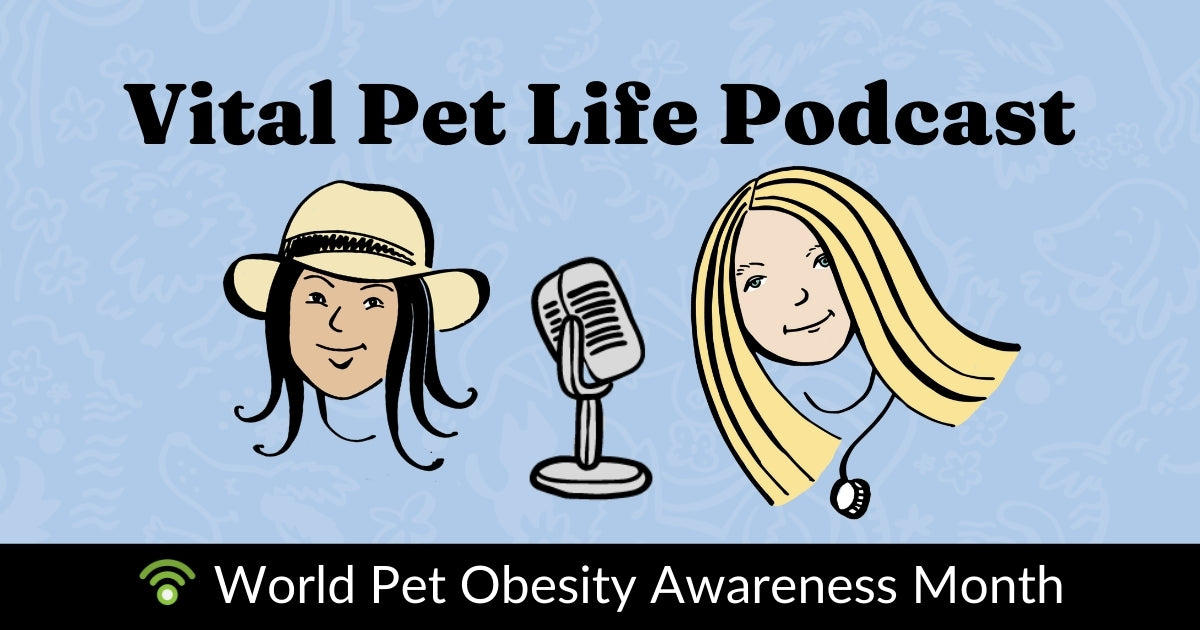
World Pet Obesity Awareness Month
December 17, 2024Welcome to the Vital Pet Life Podcast Blog! Hosted by Dr. Amber, our trusted veterinarian, and Donie, our Chief Treat Lady, this podcast is your go-to resource for pet nutrition, wellness, and happiness. In this episode, we dive into an important topic: World Pet Obesity Awareness Month. Pet obesity is a growing concern that impacts the quality and longevity of our furry friends’ lives. Join us as we explore the causes, risks, and actionable steps to combat pet obesity and keep your pets healthy.
In this episode, Dr. Amber and Donie shed light on the rising issue of pet obesity. They discuss factors that contribute to pet weight gain, the health risks associated with obesity, and practical steps to ensure our pets maintain a healthy weight. From breed predispositions to dietary habits, this episode is packed with valuable insights to help pet parents navigate their pets’ wellness journey.
Causes of Pet Obesity
Dr. Amber begins by explaining how various factors contribute to pet obesity.

-
Breed and Genetics: Some breeds, such as Labrador Retrievers, Beagles, and Dachshunds, have a higher fat-to-lean ratio, making them more prone to weight gain. In contrast, breeds like Boxers have a naturally leaner build.

- Age and Mobility: As pets age, they may become less active, leading to gradual weight gain.
Dr. Amber emphasizes, “It’s important to keep puppies and kittens at a healthy weight since early obesity can predispose them to lifelong weight challenges.”

- Spaying/Neutering and Hormonal Changes: Hormonal shifts post-surgery can increase the risk of weight gain. Similarly, endocrine diseases like hypothyroidism or Cushing’s disease may lower metabolism, contributing to obesity.
- Lifestyle Factors: Overfeeding and lack of exercise remain the leading causes of pet obesity.
Donie adds, “As pet parents, we have the power to control diet and activity levels, making small changes that can have a big impact.”
Risks of Obesity in Pets
Obesity isn’t just about extra weight; it’s a serious health concern.
- Inflammation and Arthritis: Excess fat acts as an active organ, producing inflammatory compounds that exacerbate joint pain and arthritis.
Dr. Amber notes, “This can significantly reduce your pet’s quality of life over time.”
- Diabetes: Overweight cats are especially susceptible to Type 2 diabetes, a condition strikingly similar to human diabetes.
- Decreased Lifespan: Studies show that obesity increases the risk of cancer, poor immune function, and fertility issues.
Dr. Amber shares, “Overweight pets also face heightened risks under anesthesia, which can make even routine procedures more dangerous.”
- Weight Classification: Dr. Amber provides a helpful guideline:
“A pet is considered overweight if they are 10% over their ideal weight and obese at 20% over. Recognizing these benchmarks early can help prevent further complications.”
Healthy Weight Loss for Pets
Donie shares her experience managing her dog Tuxedo’s weight, while Dr. Amber provides expert tips:
- For Dogs: Start with portion control by accurately measuring food.
Dr. Amber advises, “Aim for 1.5-2% body weight loss per week. Slow and steady is key to ensuring your pet stays healthy during weight loss.”
Gradually increase exercise, starting with short walks and progressing as stamina improves.
- For Cats: Use creative methods to encourage activity.
Dr. Amber suggests, “Feed your cat on higher surfaces like cat trees or hide food in interactive toys to engage their hunting instincts.”
She cautions, “Rapid weight loss in cats can lead to hepatic lipidosis, a severe liver condition, so always consult your vet before making drastic changes.”
Dr. Amber emphasizes the importance of balanced nutrition and supplements to support weight management and joint health:
- Supplements: Fish oil reduces inflammation, glucosamine and chondroitin support joints, and antioxidants like Vitamin E and C combat free radicals.
- Green-Lipped Mussel: A powerhouse of omega-3s and essential nutrients for overall health.
- Calorie Management: Donie reminds pet parents,
“Incorporate treats and supplements into your pet’s total daily caloric intake to avoid overfeeding. Every little bit adds up!”
Conclusion
Obesity is a preventable condition that requires proactive measures from pet parents. By understanding the causes and risks of obesity, you can make informed decisions about your pet’s health. Listen to the full episode of the Vital Pet Life Podcast for more in-depth guidance from Dr. Amber and Donie.
Don’t miss out on our future episodes—subscribe to the Vital Pet Life Podcast today!
Thank you for taking the time to prioritize your pet’s health. At Vital Pet Life, we’re dedicated to empowering pet parents with the knowledge and tools to ensure their fur babies lead happy, vibrant lives. Until next time, here’s to your pet’s health and wellness!
